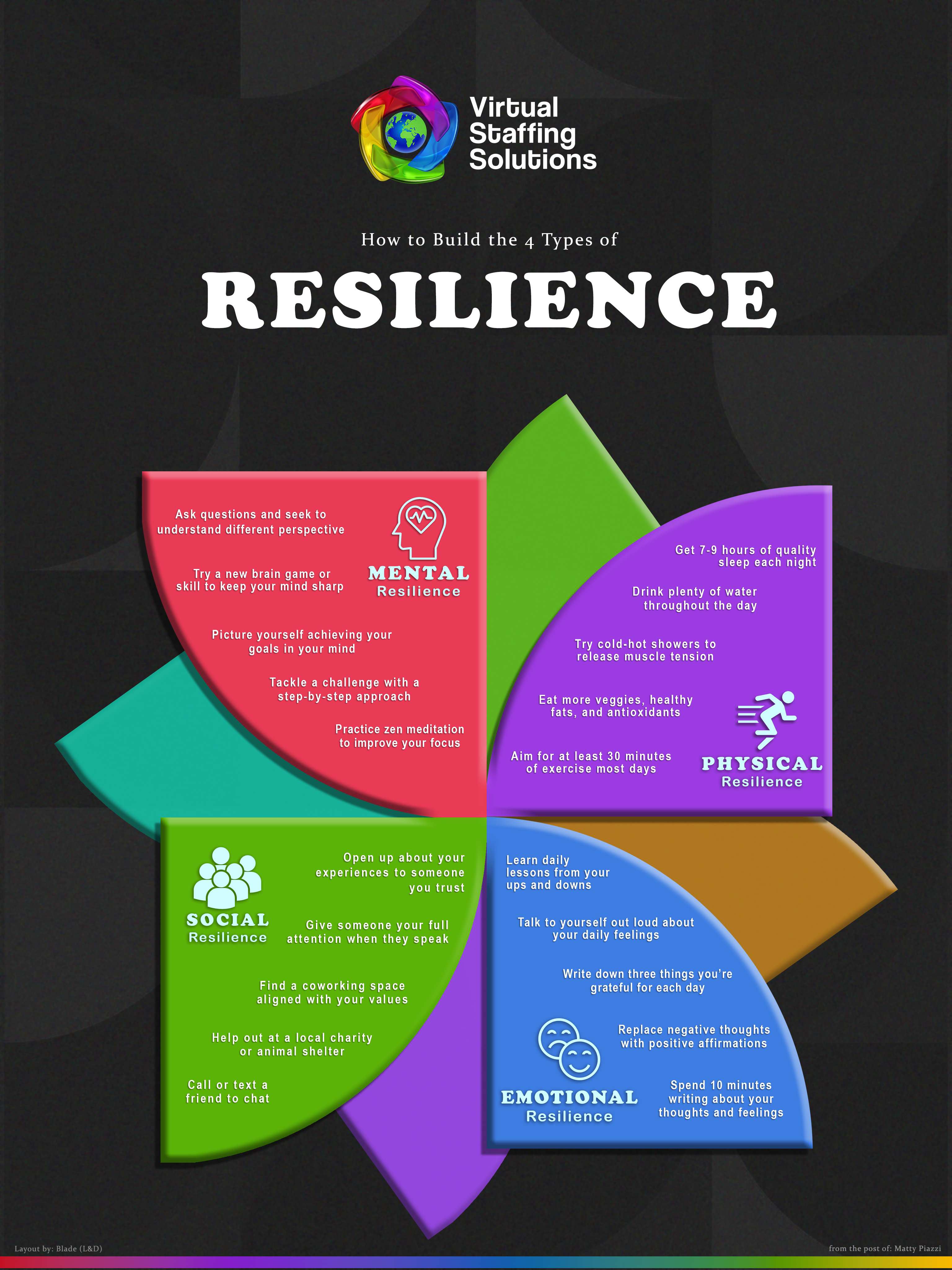🔍 How to Build the 4 Types of Resilience: Strengthen Your Ability to Bounce Back 🌟
Sent by the Learning & Development Team
Hello Team Leaders,
Resilience is the key to overcoming challenges and thriving personally and professionally. By building resilience across four essential mental, physical, emotional, and social areas, you can better manage stress, adapt to change, and maintain well-being in the face of adversity. Here’s how to develop these four types of resilience and integrate them into your daily life.
The 4 Types of Resilience and How to Build Them
1. Mental Resilience:
- Why it matters: Mental resilience helps you stay sharp, focused, and adaptable when dealing with challenges. It allows you to overcome setbacks by maintaining a strong, problem-solving mindset.
- Steps to Mastery:
- Ask Questions: Seek to understand different perspectives to broaden your thinking.
- Engage Your Brain: Try a new brain game, puzzle, or skill to stimulate your mind.
- Visualize Success: Picture yourself achieving your goals to boost motivation and focus.
- Tackle Challenges Step-by-Step: Break tasks into smaller, manageable steps to avoid feeling overwhelmed.
- Practice Zen Meditation: Spend time meditating to clear your mind and improve focus.
2. Physical Resilience:
- Why it matters: Physical resilience is about maintaining a healthy body that can withstand stress and recover from physical challenges quickly. It’s the foundation for energy and stamina.
- Steps to Mastery:
- Prioritize Sleep: Get 7-9 hours of quality sleep each night to allow your body to rest and recover.
- Stay Hydrated: Drink plenty of water throughout the day to stay energized and alert.
- Release Tension with Cold Showers: Cold therapy helps relieve muscle tension and refreshes your system.
- Eat a Balanced Diet: Incorporate more veggies, healthy fats, and antioxidants into your meals to fuel your body.
- Exercise Regularly: Aim for at least 30 minutes of physical activity most days to strengthen your body and reduce stress.
3. Emotional Resilience:
- Why it matters: Emotional resilience helps you manage your emotions, remain positive, and bounce back from difficult situations. It’s key to maintaining a stable, optimistic mindset.
- Steps to Mastery:
- Learn from Daily Experiences: Reflect on your ups and downs to gather valuable insights.
- Talk Positively to Yourself: Verbally reinforce your strengths and potential by speaking kindly to yourself.
- Practice Gratitude: Write down three things you’re grateful for each day to shift your focus toward positivity.
- Replace Negative Thoughts: Use positive affirmations to counteract negative self-talk.
- Spend Time Reflecting: Dedicate 10 minutes each day to processing your thoughts and emotions, which helps with clarity and emotional balance.
4. Social Resilience:
- Why it matters: Social resilience is about building strong, supportive relationships. A solid support system allows you to share challenges, ask for help, and recover from setbacks faster.
- Steps to Mastery:
- Open Up to Someone You Trust: Share your experiences and feelings with a friend or colleague to gain support and perspective.
- Offer Support to Others: Strengthen social bonds by offering your time and help to those around you.
- Find a Collaborative Workspace: Surround yourself with like-minded people who share your values to enhance your sense of community.
- Volunteer or Help Out Locally: Participate in community activities or charities to give back and connect with others.
- Stay Connected: Call or text a friend regularly to maintain meaningful connections.
Weekly Leadership Challenge
🌟 Build Your Resilience in One Area:
- Pick One Type of Resilience to Focus On: This week, choose one type (Mental, Physical, Emotional, or Social) to develop further.
- Implement Daily Practices: Integrate at least one step from that area into your daily routine.
- Reflect on Progress: At the end of the week, reflect on how building resilience in this area has impacted your stress levels, mindset, and overall well-being.
By focusing on these four types of resilience, you’ll develop the ability to overcome challenges, manage stress, and maintain a healthy balance across your personal and professional life. Let’s continue to grow stronger together! 🌟💪
